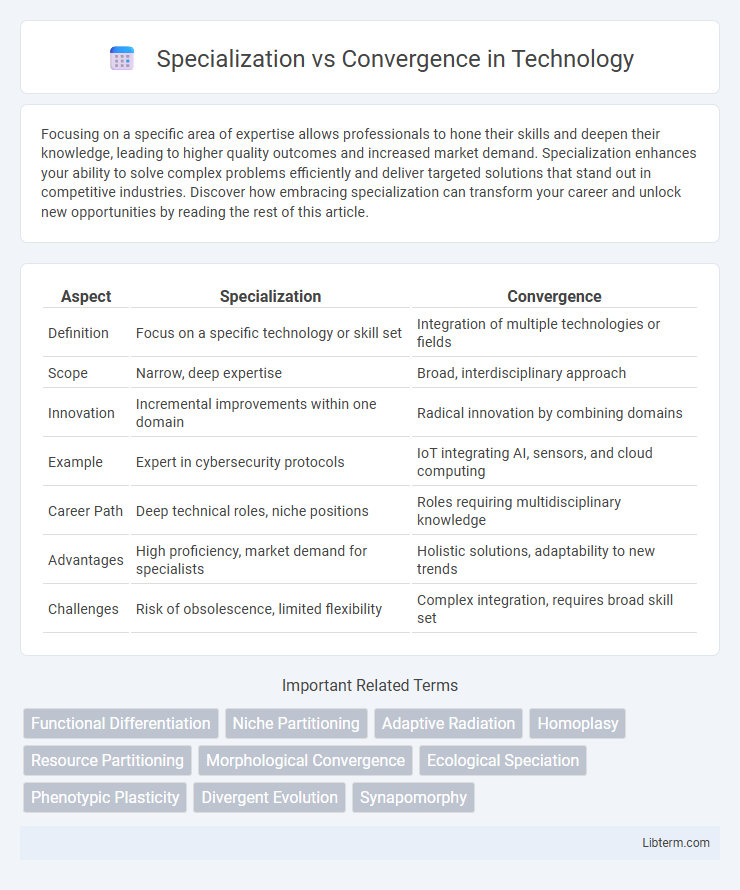Focusing on a specific area of expertise allows professionals to hone their skills and deepen their knowledge, leading to higher quality outcomes and increased market demand. Specialization enhances your ability to solve complex problems efficiently and deliver targeted solutions that stand out in competitive industries. Discover how embracing specialization can transform your career and unlock new opportunities by reading the rest of this article.
Table of Comparison
| Aspect | Specialization | Convergence |
|---|---|---|
| Definition | Focus on a specific technology or skill set | Integration of multiple technologies or fields |
| Scope | Narrow, deep expertise | Broad, interdisciplinary approach |
| Innovation | Incremental improvements within one domain | Radical innovation by combining domains |
| Example | Expert in cybersecurity protocols | IoT integrating AI, sensors, and cloud computing |
| Career Path | Deep technical roles, niche positions | Roles requiring multidisciplinary knowledge |
| Advantages | High proficiency, market demand for specialists | Holistic solutions, adaptability to new trends |
| Challenges | Risk of obsolescence, limited flexibility | Complex integration, requires broad skill set |
Understanding Specialization and Convergence
Specialization involves focusing resources and expertise on a narrow field to achieve efficiency and mastery, while convergence refers to the blending of multiple disciplines or technologies to foster innovation and comprehensive solutions. Understanding specialization requires recognizing its impact on productivity and skill depth, whereas understanding convergence involves appreciating how combining diverse knowledge areas can create new opportunities and synergies. Both concepts shape economic and technological progress by influencing how industries and professionals evolve.
Historical Perspectives on Skill Development
Historical perspectives on skill development reveal a dynamic interplay between specialization and convergence, where industrial revolutions initially propelled workers toward narrow expertise to meet specific technological demands. Over time, economic shifts and evolving labor markets encouraged convergence, fostering interdisciplinary skills that enhance adaptability and innovation. This transition reflects broader socio-economic transformations influencing workforce training and education paradigms from the 18th century to the present.
Key Advantages of Specialization
Specialization enhances productivity by allowing individuals or organizations to focus on specific tasks, leading to greater expertise and efficiency. It reduces the time and resources needed for training and minimizes errors due to repetitive practice. Increased specialization often results in higher quality output and innovation within the specialized area.
The Case for Convergence in Modern Industries
Convergence in modern industries drives innovation by blending technologies and expertise across multiple sectors, leading to more integrated and versatile products. Companies embracing convergence capitalize on cross-disciplinary collaboration, accelerating development cycles and expanding market opportunities. This strategy enhances adaptability in rapidly evolving markets, positioning businesses for sustainable growth and competitive advantage.
Specialization vs Convergence: Core Differences
Specialization involves focusing resources and expertise on a narrow area to achieve high efficiency and mastery, while convergence refers to the integration of diverse fields or technologies to create innovative solutions. The core difference lies in specialization's emphasis on depth within a specific domain versus convergence's emphasis on breadth and collaboration across multiple domains. Specialization drives expertise and competitive advantage in a single niche, whereas convergence fosters cross-disciplinary innovation and adaptability.
Impact on Innovation and Creativity
Specialization drives deep expertise and accelerates innovation within niche areas by allowing individuals and organizations to refine skills and focus resources on specific problems. Convergence fosters creativity through interdisciplinary collaboration, combining diverse perspectives and technologies to generate breakthrough ideas and novel solutions. Balancing specialization and convergence maximizes innovation by leveraging focused knowledge while encouraging cross-domain synergies.
Workplace Trends: Hybrid Skills in Demand
Hybrid skills are driving workplace trends as organizations seek employees who combine specialization with convergence across multiple disciplines. Roles requiring expertise in both technical domains and soft skills, such as data analysis paired with communication or project management, are increasingly valued. This blend enhances adaptability and innovation, meeting the demand for versatile professionals capable of addressing complex, interdisciplinary challenges.
Challenges of Over-Specialization
Over-specialization can lead to a narrow skill set that limits adaptability in rapidly changing industries, increasing vulnerability to market shifts and job displacement. It often results in reduced interdisciplinary collaboration, hindering innovation and problem-solving capabilities in complex projects. Furthermore, professionals may face challenges in career mobility as their expertise becomes too specific to certain roles or sectors.
Convergence as a Response to Rapid Change
Convergence acts as a strategic response to rapid change by integrating diverse skills, technologies, and disciplines to foster innovation and adaptability. This approach accelerates problem-solving and market responsiveness compared to specialization, which may limit flexibility due to narrow expertise. Companies embracing convergence benefit from synergistic collaboration, enabling them to pivot quickly amid shifting industry landscapes and technological advancements.
Choosing the Right Approach for Your Career
Specialization in a career enhances expertise and deep knowledge in a specific field, leading to higher demand for niche skills and potentially greater job security. Convergence involves integrating multiple disciplines, fostering innovation and adaptability, making it ideal for dynamic industries seeking versatile professionals. Evaluating industry trends, personal strengths, and long-term goals ensures choosing the right approach to maximize career growth and fulfillment.
Specialization Infographic

 libterm.com
libterm.com